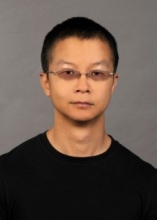CBE & MSE Seminar: Structural Characterization of the Rous Sarcoma Virus Capsid Protein in its Tubular Assembly and Simulations of the Self-assemblies of the HIV Capsid Protein

Department of Physics
University of Central Florida, Orlando, FL
Abstract: The capsid proteins (CAs) of ortho-retroviruses share a common tertiary fold but form distinct capsids. They are promising antiviral drug targets and templates for versatile nano-assemblies. However, they are tough to characterize due to the strong polymorphism. In this work, solid state NMR was applied to characterize the CA tubular assembly of Rous sarcoma (RSV), a prototype of retrovirus. A novel resonance assignment strategy was developed that exploits the well-resolved NCACX spectra to facilitate the assignment of congested NCOCX spectra, which led to a nearly complete assignment (234 residue out of the 237 residue protein). Based on this, site-specific dynamics and secondary structural information were determined. Combining with constraints from cryo-EM, we established an atomic resolution model of the tubular assembly by molecular dynamics flexible fitting. Our model shows that significant structural rearrangements take place at flexible loops and the 310 helix regions, while the rest of the protein retains its structure upon assembly. The analyses of our model suggests the assembly polymorphism is attributed to the disorder of the trimer interface between C-terminal domains. In addition, the different contact angles between helices at assembly interface with tubular and planar assemblies for HIV and RSV CA. Based on simulations of our novel coarse grain model, it suggests the two systems undergo different assembly pathways.
Bio: Bo Chen received his doctorate in physics from Northwestern University in 2007. He spent one year (2007-2008) as a visiting fellow and three years (2008-2011) as a research fellow at the National Institutes of Health. He joined UCF in 2011 where he is an associate professor.
Host: Alon Gorodetsky
Share
Upcoming Events
-
MSE 298 Seminar: Molecular Modeling in the Age of AI - From Energy Materials to Device Simulations
-
CBE 298 Seminar: Metal Electrodeposition for Modern Mineral Refining
-
MSE 298 Seminar: Quasi-1D/2D Charge-Density-Wave Materials - From Exotic Physics to Application Prospects
-
EECS Seminar: Steering Diffusion Models for Generative AI, From Multimodal Priors to Test-Time Scaling
-
CBE 298 Seminar: Finding Catalysts of Gut Reactions - The Gut Microbiota in Disease Onset and Treatment
